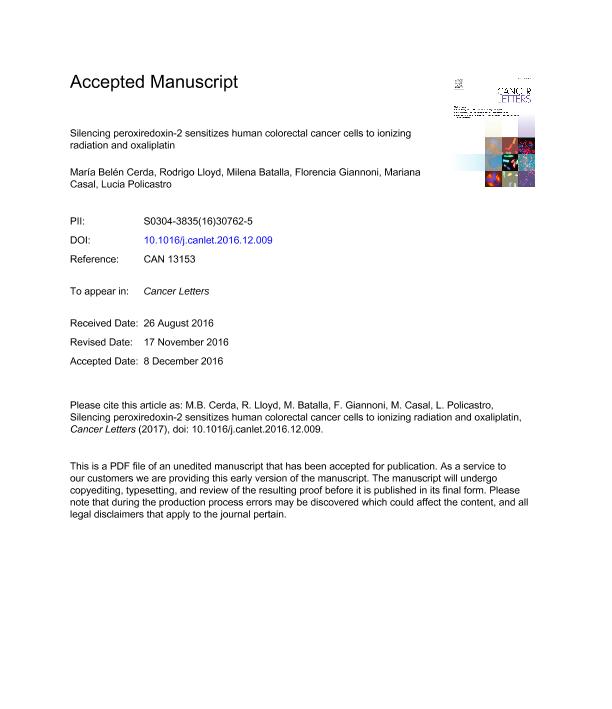Mostrar el registro sencillo del ítem
dc.contributor.author
Cerda, Maria Belen

dc.contributor.author
Lloyd, Rodrigo

dc.contributor.author
Batalla, Milena
dc.contributor.author
Giannoni, Florencia

dc.contributor.author
Casalia, Mariana Laura

dc.contributor.author
Policastro, Lucia Laura

dc.date.available
2018-04-05T14:26:04Z
dc.date.issued
2017-03
dc.identifier.citation
Cerda, Maria Belen; Lloyd, Rodrigo; Batalla, Milena; Giannoni, Florencia; Casalia, Mariana Laura; et al.; Silencing peroxiredoxin-2 sensitizes human colorectal cancer cells to ionizing radiation and oxaliplatin; Elsevier Ireland; Cancer Letters; 388; 3-2017; 312-319
dc.identifier.issn
0304-3835
dc.identifier.uri
http://hdl.handle.net/11336/40833
dc.description.abstract
Colorectal cancer (CRC) remains one of the leading causes of cancer-related death worldwide. Antioxidant enzymes decrease the generation of ionizing radiation (IR)-induced free radicals and therefore are associate to radioresistance. The main goal of this work is to study the involvement of peroxiredoxin-2 (Prx2) in the radio and chemoradiotherapy response in CRC cells in vitro and in vivo. We found that Prx2 oxidation state is associated to differential response to ionizing radiation in CRC cell lines. HCT116 radioresistant CRC cell line have lower ROS levels and a higher monomer/dimer Prx2 ratio, compared to halfway resistant Caco-2 and T84, and radiosensitive LoVo cell line. Constitutive and transient Prx2 silencing in CRC cells increase ROS levels, and most importantly, enhance in vitro radiation sensitivity. In addition, we showed that administration of IR plus oxaliplatin in down regulated Prx2 HCT116 cells has higher citotoxic effect than in control cells. Finally, radiosensitizing effect of Prx2 depletion was confirmed in vivo. These results suggest that Prx2 is an important component in tumoral radiation response, and their inhibition could improve radio and chemoradiotherapy protocols in patients with CRC.
dc.format
application/pdf
dc.language.iso
eng
dc.publisher
Elsevier Ireland

dc.rights
info:eu-repo/semantics/openAccess
dc.rights.uri
https://creativecommons.org/licenses/by-nc-nd/2.5/ar/
dc.rights.uri
https://creativecommons.org/licenses/by-nc-nd/2.5/ar/
dc.subject
Colorectal Cancer
dc.subject
Oxaliplatin
dc.subject
Peroxiredoxin 2
dc.subject
Radiation Sensitivity
dc.subject.classification
Otras Ciencias Biológicas

dc.subject.classification
Ciencias Biológicas

dc.subject.classification
CIENCIAS NATURALES Y EXACTAS

dc.title
Silencing peroxiredoxin-2 sensitizes human colorectal cancer cells to ionizing radiation and oxaliplatin
dc.type
info:eu-repo/semantics/article
dc.type
info:ar-repo/semantics/artículo
dc.type
info:eu-repo/semantics/publishedVersion
dc.date.updated
2018-04-04T14:13:51Z
dc.journal.volume
388
dc.journal.pagination
312-319
dc.journal.pais
Irlanda

dc.journal.ciudad
Limerick
dc.description.fil
Fil: Cerda, Maria Belen. Comisión Nacional de Energía Atómica; Argentina
dc.description.fil
Fil: Lloyd, Rodrigo. Comisión Nacional de Energía Atómica; Argentina
dc.description.fil
Fil: Batalla, Milena. Comisión Nacional de Energía Atómica; Argentina
dc.description.fil
Fil: Giannoni, Florencia. Consejo Nacional de Investigaciones Científicas y Técnicas; Argentina. Comisión Nacional de Energía Atómica; Argentina
dc.description.fil
Fil: Casalia, Mariana Laura. Universidad de Buenos Aires. Facultad de Medicina. Instituto de Oncología "Ángel H. Roffo"; Argentina
dc.description.fil
Fil: Policastro, Lucia Laura. Comisión Nacional de Energía Atómica; Argentina. Consejo Nacional de Investigaciones Científicas y Técnicas; Argentina
dc.journal.title
Cancer Letters

dc.relation.alternativeid
info:eu-repo/semantics/altIdentifier/doi/http://dx.doi.org/10.1016/j.canlet.2016.12.009
dc.relation.alternativeid
info:eu-repo/semantics/altIdentifier/url/http://www.cancerletters.info/article/S0304-3835(16)30762-5/fulltext
Archivos asociados
